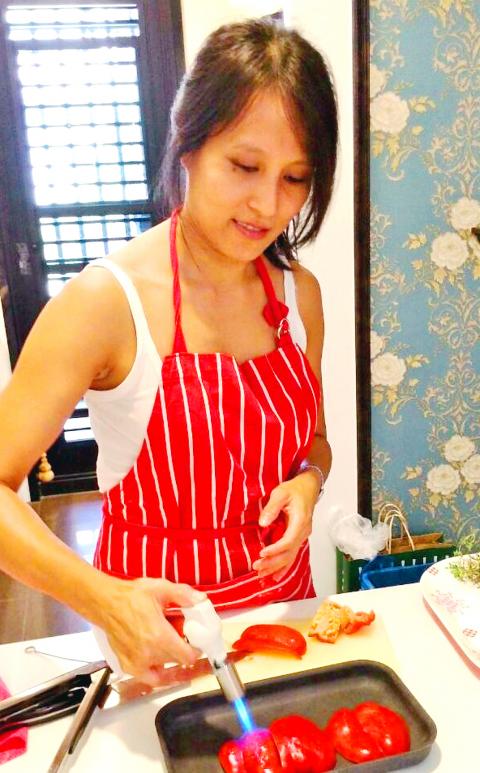Emily Quah (柯麗婷) knows how to turn up the heat in the kitchen. The Malaysian-born chef worked as a recipe developer and food writer for Gordon Ramsay and his team of Michelin-starred chefs for six years in London before moving to Taipei with her Taiwanese-Brazilian husband where she now holds weekly cooking classes from her workshop in Tianmu (天母) and at other venues.
On Sunday, Quah will be leading a coconut and spice workshop at the vegan restaurant NakedFood, where she will demonstrate how to make fusion dishes and desserts such as vegan laksa and vegan kaffir lime “cheesecake.”
Quah was exposed to cooking and baking from an early age. Her mother was an avid baker and home cook who used to take orders for almond biscuits and pineapple jam tarts a month before the Lunar New Year celebrations.

Photo courtesy of Emily Quah
“My sister and I would come home from school, have a quick lunch and then form a cookie-making production line,” Quah tells the Taipei Times.
Though she grew up in the kitchen, Quah did not initially gravitate towards a career in food. After a brief stint with consulting firm Deloitte in New York, she moved to London where she enrolled at the Leiths School of Food and Wine to train as a chef and food writer.
For Quah, it was a welcome change from corporate life.
“I enjoyed every minute of it, except perhaps when we had to tediously polish copper pans at the end of each week,” she says.
Quah was finishing an internship with BBC’s Good Food magazine when she heard that Ramsay was looking for a home economist. She applied and got the job after what she describes as “three nerve-wracking rounds of interviews.” For the next six years, she worked on over a thousand recipes for Ramsay’s team.
“Most [recpies] were inspired from their restaurant menus or their travels abroad or simply something that reminded them of their childhood,” she says.
Relocating to Taipei has afforded Quah the opportunity to whip up some of her own recipes inspired by her childhood and travels.
She didn’t realize it at the time, but growing up in Malaysia and being exposed to Chinese, Malay and South Indian food gave her the confidence to branch out and experiment with various cuisines.
“Malaysians are truly obsessive about food and I am also naturally inclined to travel far and wide in search of the most delicious meals or ingredients,” Quah says.
As for her weekly cooking classes in Tianmu (which generally costs around NT$2,000), Quah alternates between the sweet and the savory, hosting a dessert-based workshop one week and a cuisine-specific one the next. Her repertoire includes Italian, Thai and Spanish cuisines, and she is currently dabbling in Latin American-inspired cuisine.
The purpose of these workshops, Quah says, is to “enjoy a lovely meal with kindred foodies.”

The canonical shot of an East Asian city is a night skyline studded with towering apartment and office buildings, bright with neon and plastic signage, a landscape of energy and modernity. Another classic image is the same city seen from above, in which identical apartment towers march across the city, spilling out over nearby geography, like stylized soldiers colonizing new territory in a board game. Densely populated dynamic conurbations of money, technological innovation and convenience, it is hard to see the cities of East Asia as what they truly are: necropolises. Why is this? The East Asian development model, with

June 16 to June 22 The following flyer appeared on the streets of Hsinchu on June 12, 1895: “Taipei has already fallen to the Japanese barbarians, who have brought great misery to our land and people. We heard that the Japanese occupiers will tax our gardens, our houses, our bodies, and even our chickens, dogs, cows and pigs. They wear their hair wild, carve their teeth, tattoo their foreheads, wear strange clothes and speak a strange language. How can we be ruled by such people?” Posted by civilian militia leader Wu Tang-hsing (吳湯興), it was a call to arms to retake

This is a deeply unsettling period in Taiwan. Uncertainties are everywhere while everyone waits for a small army of other shoes to drop on nearly every front. During challenging times, interesting political changes can happen, yet all three major political parties are beset with scandals, strife and self-inflicted wounds. As the ruling party, the Democratic Progressive Party (DPP) is held accountable for not only the challenges to the party, but also the nation. Taiwan is geopolitically and economically under threat. Domestically, the administration is under siege by the opposition-controlled legislature and growing discontent with what opponents characterize as arrogant, autocratic

When Lisa, 20, laces into her ultra-high heels for her shift at a strip club in Ukraine’s Kharkiv, she knows that aside from dancing, she will have to comfort traumatized soldiers. Since Russia’s 2022 invasion, exhausted troops are the main clientele of the Flash Dancers club in the center of the northeastern city, just 20 kilometers from Russian forces. For some customers, it provides an “escape” from the war, said Valerya Zavatska — a 25-year-old law graduate who runs the club with her mother, an ex-dancer. But many are not there just for the show. They “want to talk about what hurts,” she